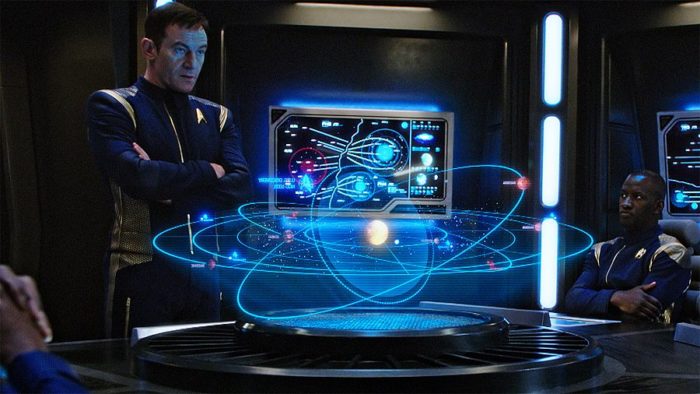Uncharacteristic F-bombs mar what would otherwise be a solid episode.
We open with Michael’s nightmare in which she subconsciously realises something perhaps she and all the other Star Fleet scientists, brought up since birth with the Prime Directive, might have been expected to suspect: the tardigrade is sentient and feels pain. This spanner in the works of the Federation’s secret weapon is one focus of the episode, while the other allows us to see Captain Lorca in action. Captured pre-credits, he’s imprisoned by Klingons with two personifications of of his own nature: the pragmatic survivor Harcourt ‘Harry’ Mudd (Rainn Wilson; The Office’s Dwight with a beard but similarly poor social skills) and idealist Star Fleet rating Ash Tyler (Shazad Latif).
The Klingon regime is their own version of The Weakest Link, in which two of the prosoners simgle out which one of them is to be beaten each day. Of course, while manipulative Harry doesn’t have a scratch on him, Lorca won’t play that game and her and Ash use some teamwork – it comes over as subtly as He-Man’s end of episode chats to camera – to escape. It’s fun but all a little too easy, though it does set up two villains for a return visit; as well as Mudd we have sadistic Klingon commander Dennas (Clare McConnell) who will presumably wish to continue her creepy and abusive relationship with Ash. “Ugh,” grunts Lorca upon hearing of her intimacy with Ash, “humans don’t even have the requisite number of organs for Klingons.” Too. Much. Information.
Which is a criticism that can perhaps be levelled at Discovery. While some Trekkies are going into meltdown over the show (and I’m not just talking about the bigots who’ve objected to the ‘lack’ of white characters – one can only imagine the torrent of bile they’ll spew upon learning of Stamet’s sexuality) over the continuity problems Discovery poses, they do have a point that the use of use of pan-dimensional mushrooms as a plot device is pretty darn silly. It’s not quite a midichlorian-level narrative offence but it comes close.
Space mushies aside, Discovery remains a solid and gripping show, with the dynamic between the characters its primary strength. Michael and Saru’s relationship continues along its uneasy path, and seeing the Kelpien officer in the captain’s chair was quietly captivating. Ash promises to be a welcome addition to the crew – a straightforward space hero in the Kirk mould – and Stamet’s mental and physical wellbeing after he injected himself with tardigrade DNA is a storyline that will, we hope, bring some of the mind-bending pseudo-science babbling that is a much-loved hallmark of Trek.
One more complaint: Trek has always been a show that kids can watch along with adults, a la Doctor Who or Lost In Space. The violence, though bloodier than previous series, hasn’t quite yet crossed the line but, with the use of the F-bomb, Discovery has no vanished behind a curtain marked ‘adults only’. It is this that is Discovery’s real misstep and one they would do well to rectify.
This review was first published on the website Vodzilla in 2017. To read it there, together with many more of my reviews, click here


